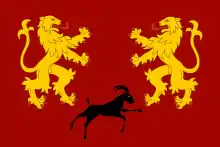Mihranids
The Mihranids were an Iranian family which ruled several regions of Caucasus from 330 to 821. They claimed to be of Sasanian Persian descent but were of Parthian origin.[1][2]

History
The dynasty was founded when a certain Mihran, a distant relative of Sasanian, settled in the region of Gardman in Utik. He was probably a member of a branch of the Mihranid family which was listed among the Seven Great Houses of Iran, and whose two other lines ruled Iberia (Chosroid Dynasty) and Gogarene/Gugark.[3] Mihran's family came to power when Mihran's great-grandson killed almost all the members of the previous ruling dynasty – "the Eṙanšahiks, the ancient native Armenian (haykazean [original emphasis]) family....Sparing only Zarmihr Eṙanšahik."[4]
The most prominent representatives of the family in the 7th century were Varaz Grigor, his son Javanshir, and Varaz-Tiridates I. Mihranids assumed a Persian title of Arranshahs (i.e. shahs of Arran, Persian name of Albania). The family's rule came to an end after the assassination of Varaz-Tiridates II by Nerseh Pilippean in 822–23.[1]
Subsequently Sahl Smbatean, a descendant of the aforementioned Arranshahik (Eṙanšahik) family,[5][6] assumed the title of Arranshah[7] and ruled significant part of Caucasian Albania.
Mihranids of Gogarene
Mihranids of Gardman
Mihranids of Caucasian Albania
- Varaz Grigor (628–636)
- Javanshir (636–680)
- Varaz-Tiridates I (680–705)
- Shiruye (699–704, usurper)
- Vardan II (705–740)
- Narseh-Dzndak (740–770)
- Gagikh (770–790)
- Stephanos I (790–821)
- Varaz-Tiridates II (821–822)
References
- Encyclopedia Iranica. C. E. Bosworth. Arran
- Encyclopedia Iranica. M. L. Chaumont. Albania.
- Toumanoff, Cyril. Chronology of the Early Kings of Iberia. Traditio 25 (1969), p. 22.
- Movses Kaghankatvatsi. The History of the Caucasian Albanians by Movses Dasxuranci. Translated by Charles Dowsett. London: Oxford University Press, 1961, Book II, chapter XVII, pp. 108-109.
- (in Russian) Movses Kaghankatvatsi. History of Aghvank. Book III, chapter XX. About the events that happened in the borders of Aghvank from the beginning of Armenian Era.
- (in Russian) Movses Kaghankatvatsi. History of Aghvank. Book III, chapter XXIII. Brief repetition of the Pedigrees.
- Minorsky, Vladimir. Caucasica IV. Bulletin of the School of Oriental and African Studies, University of London, Vol. 15, No. 3. (1953), pp. 504-529.
Sources
- Toumanoff, Cyril (1963). Studies in Christian Caucasian history. Georgetown University Press. pp. 1–599.
- Pourshariati, Parvaneh (2008). Decline and Fall of the Sasanian Empire: The Sasanian-Parthian Confederacy and the Arab Conquest of Iran. London and New York: I.B. Tauris. ISBN 978-1-84511-645-3.
- Toumanoff, Cyril (1969). The Chronology of the Early Kings of Iberia. Fordham University Press. pp. 1–33.
